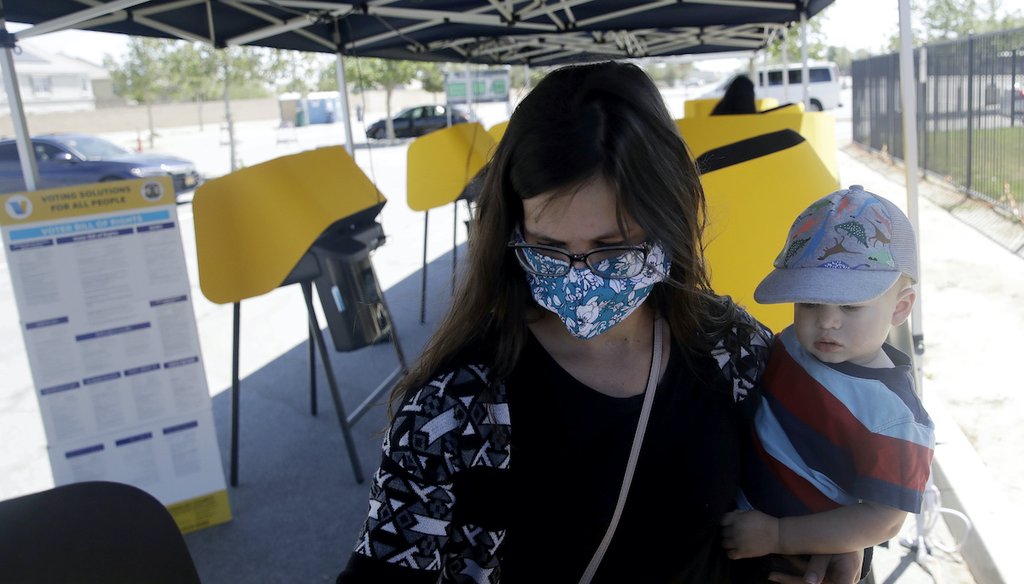Stand up for the facts!
Our only agenda is to publish the truth so you can be an informed participant in democracy.
We need your help.
I would like to contribute

Ayla Johnson votes while holding her son at a mobile voting station during a special election for California's 25th Congressional District seat on May 12, 2020. (AP)
"The Week in Fact-checking" compiles short summaries of our best work; the links will take you to our full reports. Want this report early and via email? Sign up here.
This week: Voting by mail in 2020 … Pelosi wrong about Trump’s weight … Pants on Fire for Trump on voting by mail … Stacey Abrams repeats bad info on COVID-19 … Trump removes watchdogs and picks his own … The Top 10 uncertainties about the coronavirus
How battleground states are preparing for the pandemic election
With the 2020 presidential election less than six months away, state and local officials are scrambling to prepare for a potentially massive increase in voting by mail.
In 2016, about one-quarter of votes nationally were cast by mail through absentee voting. This year, some state governments have already changed laws and policies to expand it.
The nitty-gritty of administering the 2020 vote, however, is left to local officials who are making their best guesses about how to prepare.
Sign up for PolitiFact texts
To size up how ready the country is for a pandemic election, PolitiFact interviewed state and local officials in six states frequently cited by political handicappers as the most competitive tossups in the country: Arizona, Florida, Michigan, North Carolina, Pennsylvania, and Wisconsin.
Election officials described multiple challenges with managing an expansion of mail-in ballots — even in places where it is already common — while keeping in-person voting open and safe.
Our key findings:
• Local elections officials expect a significant increase in voting by mail this fall. To prepare, they’re buying more ballots and trying to hire more workers to count them. But they are worried about the logistical challenges and running out of money.
• Some states have already begun to change their rules to encourage mail balloting, but others are taking a wait-and-see approach.
• Keeping in-person polling sites accessible and safe presents another challenge, and some supervisors are uncertain about how many sanitizing supplies they will need.
Read our full story for our interviews with election officials across the country.
— Louis Jacobson and Amy Sherman
Fact-checks of the week
Pants on Fire for Trump on Michigan voter fraud. President Donald Trump recently tweeted, "Breaking: Michigan sends absentee ballots to 7.7 million people ahead of Primaries and the General Election. This was done illegally and without authorization by a rogue Secretary of State. I will ask to hold up funding to Michigan if they want to go down this Voter Fraud path!" We rated this Pants on Fire! The Michigan secretary of state announced that she was sending an application for absentee ballots to registered voters, not an actual ballot. The state constitution guarantees registered voters access to an absentee ballot.
Nancy Pelsoi claims Trump is "morbidly obese." That's False. House Speaker Nancy Pelosi told CNN she was concerned that Trump said he was taking hydroxychloroquine. "I would rather he not be taking something that has not been approved by the scientists, especially in his age group and in his, shall we say, weight group," Pelosi said. "He’s morbidly obese, they say." We rated Pelosi’s claim False. Donald Trump does not fit the CDC’s description of "severely obese." Some have questioned official reports of both Trump’s height and weight. But even if Trump isn’t telling the truth about his weight, it’s extremely unlikely he would be classified as morbidly or severely obese.
Stacey Abrams wrong on skyrocketing COVID rates. Abrams, a former Democratic candidate for governor of Georgia, said, "Since the reopening of the state, we’ve seen our COVID rate skyrocket by 40%." We rated that False. In reality, the period after reopening had 12% fewer cases. Even if the policy shift did cause infections to rise, it wouldn’t appear until several weeks later. Abrams spoke before that effect would show up in the data. She was quoting a retracted news report that was widely shared.
Use caution in wearing gloves. A Facebook post that went viral said, "If you are wearing the same set of gloves all over town you are only spreading germs everywhere you go. Every door you touch, the cart, the supplies, your phone, your car door, your face, money and change. … DON’T WEAR THE SAME GLOVES EVERYWHERE!" We rated this statement True. Infectious disease experts said gloves don’t really protect the wearer since the coronavirus doesn’t seep in through the skin. And they don’t limit the disease spread since they are often worn too long or removed incorrectly. Washing hands often is the step that actually kills the coronavirus.
Trump has pushed out 5 inspectors general
Since early April, Trump has taken steps to remove or replace five inspectors general from their respective offices in the intelligence community and the departments of defense, health and human services, state and transportation. Four of the changes came on Friday nights.
Trump said that his actions are routine. But there’s no precedent for Trump’s rapid removals, experts told us. President Barack Obama fired one inspector general.
"We are seeing right now, in real time, a true crisis in terms of the ability for there to be independent oversight and accountability within the executive branch," said Liz Hempowicz, director of public policy at the nonprofit Project On Government Oversight.
One wrinkle that's troubling, experts said, is the appointment of "acting" inspectors general — a move that, unlike for permanent nominations, doesn’t require Senate confirmation.
"To me, what that says is that the president is exercising the ability to cherry pick who is conducting oversight, even in the interim," Hempowicz said.
Read our story to learn the names of the five inspectors general and what they were investigating at the time of their removal.
— Bill McCarthy
Knowing the facts has never been more important. Please consider donating to PolitiFact today.
What we’re reading & watching
• I participated recently in a YouTube discussion about "Presidential Communications in a Time of Crisis," through George Washington University’s Institute for Data, Democracy and Politics. You can see part 1, part 2 and part 3 via YouTube. Other panelists were misinformation researcher Ethan Porter and former White House press secretaries Joe Lockhart and Ari Fleischer.
• The Poynter Institute’s senior media writer Tom Jones recently went behind the scenes at the Sunday morning news show "Face the Nation." The show has retooled during the coronavirus to focus on guests that include newsmakers and scientific experts; the politics panel has been taking a break. Jones reports that the changes have taken a good show and elevated it to its best viewership in years.
• A story in the Washington Post recently took a wide look at how the United States has arrived at its current moment battling a pandemic. "Crisis exposes how America has hollowed out its government," by Dan Balz, shows how the government’s response represents chronic weaknesses and years of underinvestment, compounded by President Trump’s hostility to the federal bureaucracy.
The Top 10 uncertainties about the coronavirus
PolitiFact has been fact-checking claims about the coronavirus and COVID-19 since it first appeared. Months later, basic facts about the virus still need to be hedged with caveats and warnings that our knowledge is limited or subject to change. Yet we need to strongly correct misleading and false claims, so sometimes the data limitations get lost in the discussion.
Here are the first three items in our Top 10 list of the most pressing uncertainties about the coronavirus:
1. How many people have been exposed to the coronavirus.
Yes, there are counts of confirmed cases that the cable news channels feature regularly. But those are only reported cases. We don’t know the full extent of how many people have been exposed to the virus, formally known as SARS-CoV-2.
While some people are exposed, get COVID-19 (the disease caused by the virus) and end up in the hospital, other people get only mildly sick, and still others carry the virus without any symptoms at all. This means the true number of people who have the virus is larger than the number of reported cases, and probably much larger.
2. How widespread the virus is.
If we don’t know precisely how many people have the virus, then we also don’t know where the people who have it are. Is the coronavirus mostly in big cities, or is it in the suburbs or rural areas? Are some geographic areas hit harder than others, or are they just testing less? We’ve talked to sources who have informed guesses, but nobody knows for sure. Also, the virus is on move, so whatever the picture would be today could be quite different in a few weeks.
3. How contagious the virus is.
The CDC says coronavirus spreads in droplets, which suggests you’d have to be near an infected person to catch it. But there’s nagging evidence that it spreads faster in enclosed spaces or where people work right next to each other (think of nursing homes or meatpacking plants), which suggests it has some potential to become aerosolized or airborne. Though rare, there are discouraging anecdotes of people practicing social distancing who get the virus anyway.
The coronavirus seems to be more contagious than the flu but less contagious than measles. Right now, researchers believe a person with the coronavirus typically spreads it to two or three others. (This is called the virus’s R0 or "R-naught" factor, and it’s 2 to 2.5.) But these are estimates, not hard data.
Pants on Fire
Do you smell smoke?
Here's your Pants on Fire fact-check of the week:
No, Democrats aren’t advocating euthanizing senior citizens to save Social Security.
You knew that one wasn’t true, didn’t you?
See what else we've rated Pants on Fire this week.
Our Sources
See linked stories for sources





















































